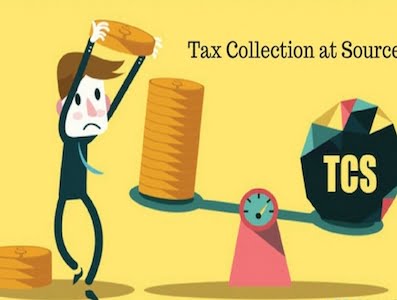
TCS, or tax collection at source, is a feature of the Indian Income Tax Act. A specific tax percentage must be collected from the buyers of extraordinary transactions under these laws. The vast majority of these interactions are based upon commerce or business and the average citizens are exempted from such taxes.
What is Tax Collected at Source?
Table of Contents
TCS stands for Taxes Collecting at the Source in full. The seller is liable for paying this TCS tax, which the lessee or buyer is responsible for collecting. As defined in section 206C of the Income Tax Act of 1961, the goods are as described above.
For example, If a box of cereal costs Rs. 200, the buyer will pay Rs. 40, which is the tax paid at the point of sale. The money is subsequently transferred to a selected bank branch that has been authorized to accept the payments. The seller is simply responsible for collecting this tax from the buyer, but they do not have to pay it themselves. It must be charged while selling products, transactions, or when the buyer is supplied with a receipt for an amount in cash.
Sellers that fall under TCS
- Statutory Corporation or Authority
- Cooperative Society
- Partnership Firms
- Company
- Local Authority
- State and Central government
- Any HUF or individual whose previous fiscal year’s total sales and gross income exceeded the predetermined monetary limits outlined in Section 44AB.
Also Read: What Is TAN? And Its Importance In Businesses & For individual
Buyers that fall under TCS
Buyers are individuals or groups who have the right to purchase goods at auctions, tender, sale, or another form of sale. The following entities and individuals are not included in the definition of “buyers” for TCS or tax collected at the source –
- Central Government
- Social and sports clubs
- Consulate
- Public Sector Entities
- Public Sector Companies
- High Commission Embassy
- State Government
- Trade Committee of any Foreign Nation
Tax Collected at Source (TCS) Certificate
An entity or individual responsible for tax collection must submit a copy of the TCS certificate together with Form 27D within a week of receiving it, regardless of when the tax was generated.
Each buyer of TCS will receive a certificate for the period ending on 30th September and 31st March of any financial year multiple times. This certificate can be issued at the end of a month, including the final day. However, the buyer’s request for such a certificate is required instead of the seller’s.
It is possible to receive a new TCS certificate if the original is lost, and the entity in command of the TCS or tax collection will issue one that can be verified and printed.
Also Read: GSTIN: What Is GSTIN Number? – Check & Verify GSTIN/UIN Number Online?
Exemptions in Tax Collected at Source
There are two types of exemptions in TCS, and they are as follows.
TCS at Lower Rate
Using Form 13, the buyer can request the Assessing Officer to apply a lower rate to TCS. The officer will then analyze the total income and check if the buyer is eligible. The Assessing Officer might provide a certificate that specifies the lower rate of TCS.
Total TCS Exemption
The buyer must fill out a Form 27C to indicate that he is exempt from paying Tax Collected at Source in full. The declaration must clearly state that the commodities claimed are for processing and production instead of a sale. Those who oversee tax collection must also be provided a copy of the declaration form. They must then submit it to the relevant authorities within one week of receiving it. If the goods were for personal use, the buyer is again exempted from TCS.
Also Read: New GST Rates In 2022
Tax Collected at Source Rates in India
- Alcoholic liquor manufactured for human consumption: 1%
- Timber wood collected from a leased forest: 2.5%
- Timber wood when not collected from a forest but from other sources: 2.5%
- Tendu leaves: 5%
- Forest products other than timber and tendu leaves: 2%
- Parking lot, Mining, & Toll Plaza: 2%
- Coal, lignite, and iron ore: 1%
- Bullions exceeding Rs. 2 lakh: 1%
- Jewelry exceeding Rs. 5 lakh: 1%
- Motor vehicle purchases exceeding Rs. 10 Lakhs: 1%
- In cases where the preceding financial year’s total turnover exceeds Rs.10 crore, and the seller obtains sale consideration above Rs. 50 lakh, the seller must collect TCS from the buyer: 0.1% (Without PAN, 1% is TCS)
Tax Collected at Source Under GST
Anyone who sells items online will receive money from the e-commerce portal following a deduction of an IGST tax of one percent. (CGST 0.5%) and SGST (SGST 0.5%)
On or before the 10th of the next month, the tax must be remitted to the appropriate authorities.
GST registration is a requirement for all businesses, regardless of size.
The new rules take effect on 1st October 2018. If you’re interested in selling items on Amazon, you can contact Mr. Rajan (seller) (e-commerce operator). He gets an order for Rs. 20,000, which includes the commission. As a result, Amazon will withhold Rs. 200 in tax (1 percent of Rs. 20,000).
Also Read: Everything MSME’s Need To Know About GST
Electronic TCS
The term “e-TCS” refers to submitting TCS returns that utilize the internet network. As a result of the TCS mandate, all government and corporate collectors must file their TCS returns electronically following the 2004-2005 financial year. Other collectors allow you to file your TCS returns electronically or in paper form. The NSDL collects the e-TCS returns of the Income Tax Department on their behalf.
Form Formats for Filing TCS:
- An optical disc with a capacity greater than 650 megabytes
- 4 mm 2 GB/4 GB (90M/120M) DATA Cartridge
- The 3.5-inch diskette holds 1.44 megabytes of data.
- In addition to Form No. 27B, the tax returns must be checked.
Wrapping Up
Income tax law states that sellers must collect TCS from buyers if they debit their accounts or receive money from them via any method, whatever comes first. As a result, the amount deducted from the buyer’s account or paid by the seller must include VAT/excise/GST. In other words, the TCS must include GST.







